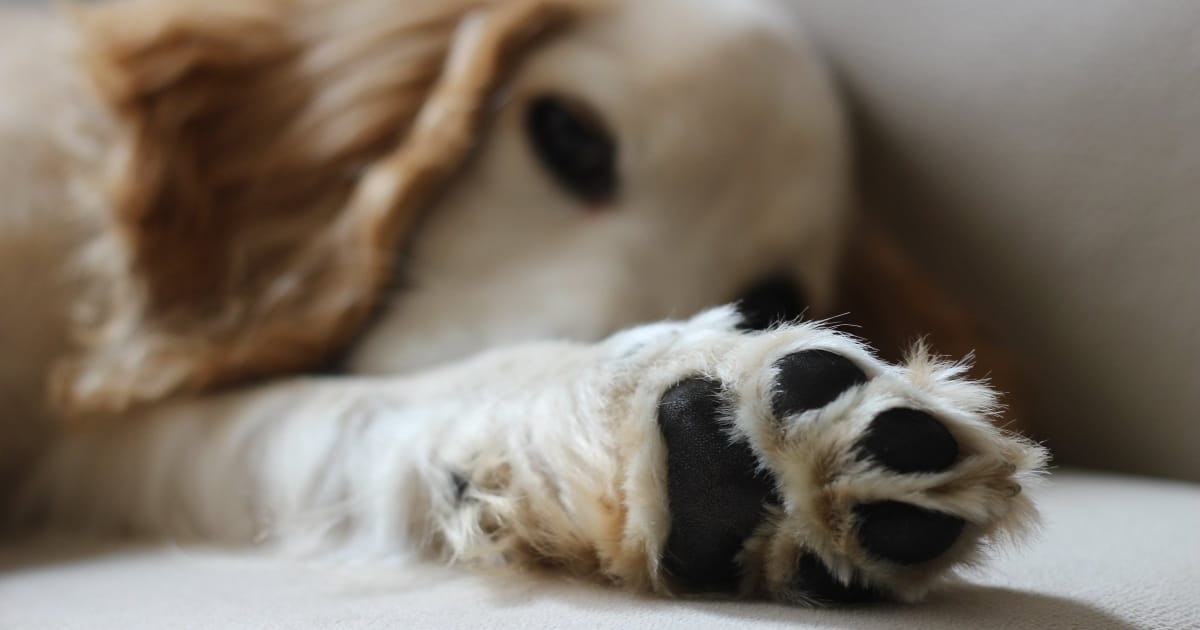If you’ve noticed my dog keeps chewing her paws persistently, it’s natural to feel concerned. Paw chewing in dogs is a common issue that can stem from a variety of causes, ranging from simple irritation to underlying health problems or emotional distress. This seemingly innocent behavior can be a powerful indicator of something amiss in your dog’s life. Understanding the underlying reasons behind this behavior is crucial to addressing it effectively and ensuring your furry friend’s overall well-being.
Just like we might unconsciously fiddle with a pen or bite our nails when anxious, dogs exhibit certain behaviors when they’re experiencing discomfort or distress. These cues shouldn’t be taken lightly, as they often provide valuable insights into their physical and emotional state. In this article, we will delve into the various aspects of paw-chewing, explore the potential causes, and provide actionable strategies to promote your dog’s comfort and happiness.
Understanding Your Dog’s Paw-Chewing Behavior
When your beloved canine companion engages in persistent paw-chewing, it’s often a sign that something isn’t quite right. This seemingly simple action can be a gateway into understanding your dog’s physical and emotional well-being. Deciphering the underlying causes of paw-chewing is essential for providing the appropriate care and support. It’s important not to simply dismiss it as a trivial habit, as persistent paw-chewing can lead to skin irritation, infections, and even behavioral issues if left unaddressed. Let’s explore how we can better understand this intriguing behavior and pave the way to a happier, healthier life for our canine friends.
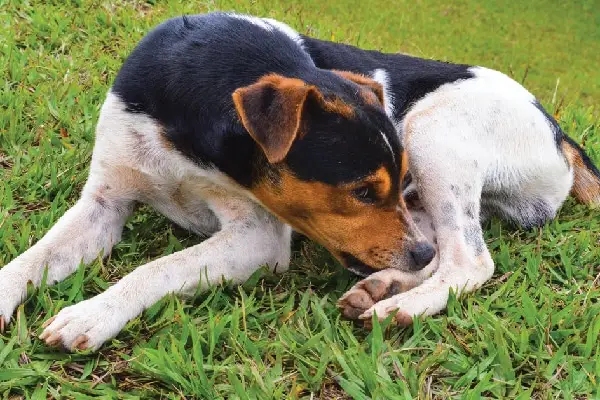
My dog keeps chewing her paws – The Significance of Behavior in Dogs
Dogs are adept communicators, though their language isn’t always readily understood by humans. They rely on a combination of body language, vocalizations, and behavioral cues to convey their needs and emotions.
Just as a sigh might signify fatigue in a human, a dog’s persistent licking or chewing at their paws can be a subtle yet compelling message. Each behavior carries a specific meaning and can offer a valuable window into their inner world.
It’s easy to overlook the subtle cues our dogs provide, often attributing their behavior to simple restlessness or boredom. However, these seemingly “minor” actions can be a key to unlocking the secrets of their emotional well-being. Imagine a scenario where your dog is experiencing discomfort from a hidden injury or suffers from allergies that cause intense itching. She might express this by gnawing at her paws, attempting to alleviate the discomfort. We humans express discomfort through verbal communication, like complaining, but our dogs are unable to do so. This subtle behavioral signal can be our only clue to the hidden source of their distress.
By paying closer attention to changes in your dog’s behavior, including paw-chewing patterns, you can gain valuable insights into their health and emotional state.
Common Misconceptions About Paw-Chewing
One of the common misconceptions about paw-chewing is assuming that it’s always a simple habit. While it can sometimes be a learned behavior from puppies or a nervous tick, the primary reason behind it is often a signal that something is off.
For example, a dog who gets overenthusiastic during playtime and bites its own feet might cause some injuries. It will start to experience some pain and immediately lick or gnaw at these injuries. It can develop into a habit if not addressed and heal properly.
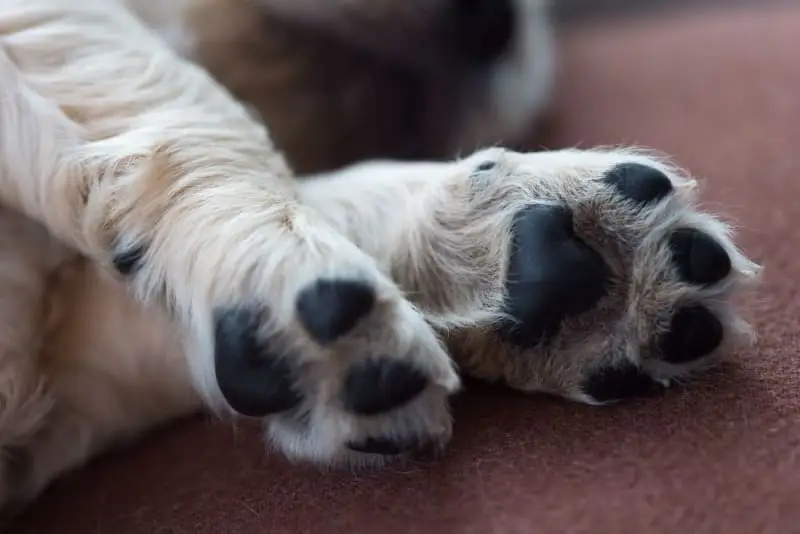
Another incorrect assumption is that paw-chewing is always due to allergies. While allergies are a frequent cause, there are other factors that can trigger this behavior, including boredom, anxiety, and underlying medical conditions. We must always consider these factors besides allergies.
Failing to address the root cause of paw-chewing can lead to more complications. If allergies are to blame, leaving them untreated can worsen skin irritation, potentially leading to infections. If boredom or anxiety are the culprits, your dog’s behavior might escalate, affecting their overall well-being.
Instead of dismissing it as a simple habit, it’s important to approach paw-chewing with sensitivity and curiosity. We should view it as a potential window into their health and try to understand the specific reason behind it. By paying attention to your dog’s behavior and exploring the triggers, you’ll be better equipped to provide the support they need.
Identifying the Root Causes of Paw-Chewing
Paw-chewing can be a complex issue with various underlying causes. To address it effectively, we need to explore the potential triggers to determine the most appropriate course of action. Let’s dive deeper into the potential reasons behind this behavior and uncover valuable clues that can help us understand what’s going on with our canine friends.
Allergies and Their Impact on Dogs
Dogs, just like humans, can suffer from allergies. Environmental triggers such as pollen, dust mites, and certain fabrics can lead to skin irritation, resulting in excessive itching and paw-chewing.
Imagine the discomfort you experience during a severe pollen season with stuffy noses and itchy eyes. Now, visualize your dog experiencing similar symptoms without the ability to articulate what’s wrong. This heightened sensitivity can stem from exposure to triggers such as tree pollen, grass, or even certain household cleaning products. One of the symptoms they might express is excessive paw-chewing.
Allergies can manifest in a variety of ways. Some dogs might experience redness, bumps, or even hair loss around their paws or other areas of their body. They might also develop hot spots, which are areas of inflamed, irritated skin. If your dog doesn’t show any external signs of irritations, allergies should still be considered as a potential cause.

Allergies can be especially challenging during seasonal shifts. As the environment changes, your dog’s exposure to new allergens can trigger a chain reaction of discomfort. It’s crucial to be aware of your dog’s surroundings and pay attention to seasonal changes that might introduce new allergens into the environment.
Boredom as a Contributing Factor
Dogs are intelligent beings with an inherent need for mental stimulation and physical activity. A lack of engagement can lead to boredom, which can sometimes manifest as excessive paw-chewing.
Have you ever noticed how some children fidget or twirl their hair when they’re bored or restless? A bored dog can act in a similar way, resorting to repetitive behaviors to alleviate their mental state.
Consider a scenario where your dog is left alone for extended periods without sufficient opportunities to play, explore, or interact with their environment. This lack of mental and physical stimulation can lead to frustration and a feeling of restlessness.
Just as humans might engage in mindless activities when bored, dogs might resort to paw-chewing as a way to distract themselves. For many dogs, the act of chewing provides a stimulating and soothing sensation when they’re not getting enough physical or mental activity. It’s important to provide ample opportunities for play, training, and exercise to keep your dog stimulated and prevent boredom-related paw-chewing.
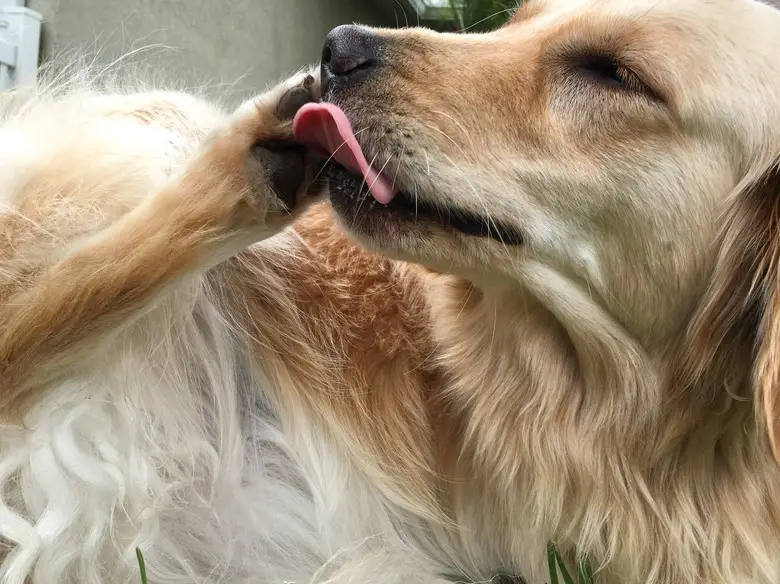
Anxiety and Stress Responses in Dogs
Stress and anxiety can significantly impact a dog’s behavior, sometimes leading to excessive paw-chewing. Dogs can experience various stressors, such as loud noises, changes in their routine, or even separation from their loved ones.
Imagine a dog who has been through a traumatic event, such as being abandoned or experiencing a natural disaster. They are likely to feel more anxious and stressed than before the events. This heightened emotional state can manifest in behaviors such as excessive paw-chewing.
Changes in the environment or routine can also trigger anxiety in dogs. A move to a new home, the addition of a new family member or pet, or even a change in their regular walking route can cause stress for some dogs.
It’s essential to recognize that each dog has a different tolerance for stress and anxiety. What might cause mild stress for one dog might trigger significant anxiety in another. Paying close attention to your dog’s behavior and body language is essential for identifying stress-related triggers.
Allergies: A Closer Look
Allergies are a common cause for various skin irritations and paw-chewing in dogs. Understanding the different types of allergies, recognizing the symptoms, and implementing appropriate strategies are essential to managing this issue.
Types of Allergens Affecting Dogs
Dogs can develop allergies to a wide range of substances found in their environment. These allergies can be categorized broadly as environmental or food-related.
Let’s consider some of the most common environmental allergens that affect dogs:
- Pollen: Tree pollen, grass pollen, and weed pollen are common outdoor allergens. It’s particularly common during spring and summer. Dogs with pollen allergies might display symptoms like incessant paw-chewing or scratching.
- Dust Mites: These microscopic creatures are found in bedding, carpets, and other household furnishings. Sensitive dogs often exhibit allergic reactions through persistent itching and chewing.
- Mold: Mold spores are ubiquitous in humid environments and can trigger a range of reactions in dogs, with some experiencing intense itching and skin irritation. They can cause a wide range of negative symptoms, from a runny nose to severe respiratory issues.
- Fleas, mites, or other parasites: Fleas are common parasites that live on dogs and feed on their blood. Not only are they incredibly irritating, but they can also cause a massive allergic reaction in some dogs.
Let’s focus on potential causes of food-related allergies:
- Beef: A leading cause of food allergies in dogs. If you suspect your dog has a food allergy, you might consider carefully analyzing their diet and removing beef.
- Dairy: Some dogs are sensitive to the proteins in cow’s milk.
- Chicken: While a staple in many dog foods, chicken can be a trigger for allergic reactions in some dogs.
- Gluten: Found primarily in wheat, barley, and rye, gluten can also cause allergic responses.
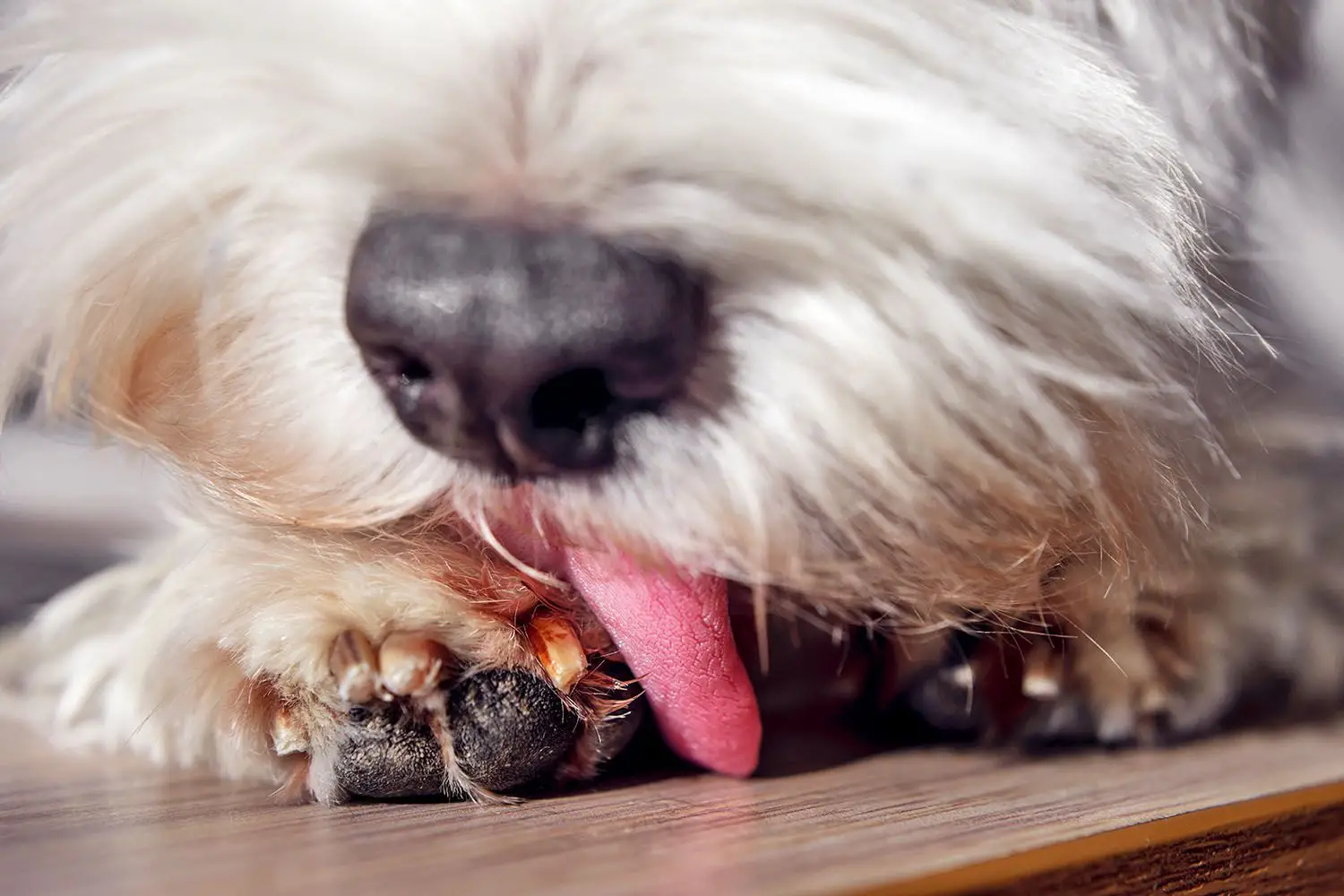
Recognizing Signs of Allergies
Allergies can be tricky to diagnose, as they often manifest with subtle or varied symptoms. Recognizing these symptoms is crucial for addressing the issue promptly.
The first indication of an allergic reaction in your dog might be excessive licking or chewing at their paws. Some dogs might bite at their feet and legs excessively in an attempt to relieve the itching.
Other signs to watch for include excessive scratching, redness, and bumps on their skin. Some dogs might also develop hot spots, which are areas of inflamed, irritated skin. Additionally, their skin might be prone to infections, or they might have an unusually bad smell. It might be hard to recognize because some of the symptoms might be overlooked regularly.
Consider their behavior. Do they seem excessively lethargic or restless? Are they shedding more than usual, or their hair seems unusual? It can be vital signs to help identify allergies.
How to Address Allergy-Related Paw-Chewing
If you suspect your dog has allergies, it’s crucial to consult with your veterinarian. They’ll be able to conduct a thorough examination and evaluate your dog’s symptoms.
For example, your vet might recommend blood tests or allergy skin testing to pinpoint the specific allergens impacting your dog. Some veterinarians prefer to conduct skin tests on dogs, especially those suffering from skin irritations. This allows them to identify the specific cause of allergies based on the dog’s reaction to various potential allergens.
Once the allergens are determined, your vet might recommend various treatments to manage the allergies. Treatment options vary depending on the severity and nature of the allergy. They might prescribe anti-inflammatory medications like steroids to help relieve immediate symptoms and to prevent further irritation.
In some cases, they might advise dietary changes to eliminate potential food-related allergens. Additionally, they may suggest regular baths using medicated shampoos to soothe and cleanse the skin.
The Role of Boredom
Boredom can be a significant contributor to a dog’s paw-chewing behavior. Understanding dogs’ inherent intelligence and providing sufficient mental and physical stimulation is crucial for preventing boredom-related behavior.
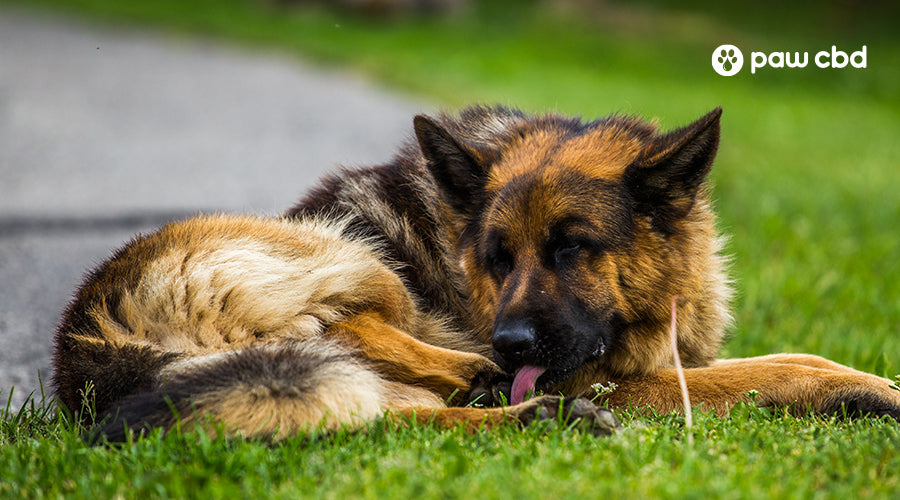
Understanding Canine Intelligence
Dogs are remarkably intelligent beings who thrive on mental stimulation. They have a natural desire to learn, solve problems, and interact with their environments.
Let’s consider how a dog thinks. They can learn commands, tricks, how to interact with members of the family, what behaviors are appropriate and inappropriate, and a wide range of other complex information.
Just as humans benefit from intellectual challenges, dogs require mental stimulation to maintain their well-being. They have a natural urge to figure things out and learn new things. If their mental needs aren’t met, they can become restless, anxious, and frustrated.
We must always remember that a dog’s actions have reasoning behind them. Dogs’ minds are constantly working, which is why they often try to comprehend their surroundings and solve challenges. If their mental capacity is not utilized, they might resort to undesirable behaviors like chewing on inappropriate items or pacing endlessly around the house.
It plays a crucial role in understanding why our dogs engage in certain behavior. It is important never to underestimate their intelligence and always engage them in intellectually stimulating activities.
Activities to Prevent Boredom
Engage your dog in a variety of activities to keep their minds active and stimulated. This can involve teaching them new tricks, playing interactive games, or introducing them to puzzle toys.
Dogs that are not given opportunities for physical activity and mental engagement are more likely to develop unwanted behaviors or develop emotional issues. This could cause anxiety, depression, and many other symptoms, including paw-chewing.
Interactive games are a great way to engage your dog and prevent boredom. Play fetch, hide-and-seek, or engage in other games that encourage them to think and use their bodies.
Puzzle toys can also keep your dog entertained and stimulated. They require dogs to use their problem-solving skills to obtain a treat or toy. Using puzzle toys is a great way to encourage mental stimulation and help prevent boredom-related behavior.
Importance of Routine and Structure
Routine and structure are essential for a dog’s well-being. Establishing a consistent daily schedule allows them to anticipate what to expect throughout the day, contributing to a sense of security and calmness.
Just like humans, dogs thrive on predictability. When they have a consistent routine, they feel more comfortable and secure. By following a routine, dogs feel safe and relaxed, which can help reduce excessive paw-chewing.
Creating a routine includes consistent feeding times, regular exercise, designated playtime, and times for rest and relaxation. It might be beneficial to create a written schedule so that you can stick to it throughout the week.
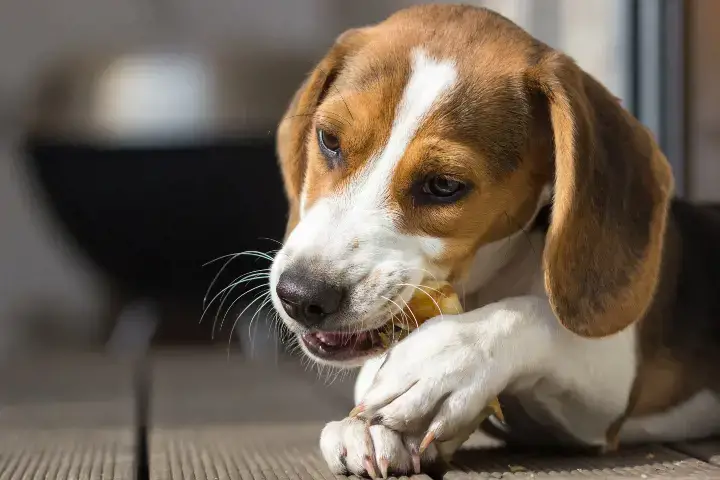
When you stick to a routine, dogs can anticipate when they will be fed, walked, or played with. This can positively impact their behavior and reduce unnecessary anxiety or boredom.
Emotional Factors Behind Paw-Chewing
Paw-chewing in dogs is often linked to emotional factors such as stress, anxiety, or even feelings of insecurity. This section explores the psychological underpinnings of repetitive behaviors and how they relate to a dog’s environment.
Psychological Perspectives on Repetitive Behaviors
Repetitive behaviors like paw-chewing are often interpreted as coping mechanisms. From a psychological standpoint, repetitive actions can provide a sense of control or comfort in stressful situations.
When humans are overwhelmed or stressed, they often engage in repetitive behaviors. For example, people might chew on their nails, fidget with their hair, or play a specific song repeatedly – these actions have similar roots as dogs repetitively chewing on their paws.
These behaviors can help reduce anxiety and stress or provide a feeling of control in a stressful situation. Dogs can engage in repetitive behaviors for similar reasons.
When dogs are feeling anxious or uncertain, they might resort to paw-chewing as a way to soothe themselves. It can be a way of releasing pent-up energy or providing a sense of comfort during overwhelming situations.
Coping Mechanisms in Dogs
Similar to humans, dogs use coping mechanisms to manage their feelings and emotions. Understanding these strategies helps understand the underlying causes of paw-chewing in certain circumstances.
Dogs have a limited ability to effectively communicate their emotions and feelings, which makes these behaviors crucial to recognize.
Dogs who experience separation anxiety, for example, might resort to paw-chewing as a way to cope with the distress they feel when their owners leave. They might also show signs of destructive behavior, which they often do to express their frustration.
Certain behaviors such as excessive barking, whining, or pacing can all be responses to underlying feelings of insecurity or stress. When you take into consideration that all their behaviors have meaning and a purpose, you can then better comprehend why they behave the way that they do.
The Link Between Environment and Emotional State
A dog’s environment plays a crucial role in their emotional well-being. A challenging or threatening environment can lead to stress, triggering behaviors such as paw-chewing.
Consider how your environment influences your emotional state. If you find yourself constantly in a fearful or frustrating situation, you might be more prone to experience anxiety than usual. Think about your dogs in a similar way.
A dog who feels unsafe or constantly threatened in their environment might exhibit signs of stress or anxiety. This can manifest in multiple ways, including changes in their eating habits, excessive barking, or excessive paw-chewing.
The environment is not only limited to where they live. It can also be determined by what people they regularly interact with, how they are treated, the overall quality of their food, and much more.
Behavioral Insights into Paw-Chewing
Understanding the underlying cues and signals related to paw-chewing behavior in dogs allows for better assessment and management of this common issue.
Observing Changes in Behavior
Monitoring changes in behavior goes hand-in-hand with identifying potential triggers for paw-chewing behaviors. Changes in a dog’s typical behaviors could indicate underlying issues that need to be addressed.
Dogs who are experiencing a decline in their health, suffer from allergies, or are developing behavioral issues might show changes in their behaviors. The presence of these behavioral changes should not be considered a minor issue.
For example, if a dog who isn’t typically anxious begins chewing excessively on their paws, it might be an indicator of a new or developing medical condition or emotional stress. It can indicate that something has changed in their environment, lifestyle, or general health.
Be vigilant in recognizing any change in your dog’s usual tendencies. This includes changes like eating habits, sleep patterns, interest in playing, energy levels, and overall interaction.
The Importance of Consistency in Training
Consistency in training and providing positive reinforcement is crucial for managing paw-chewing behaviors. Creating a clear and consistent communication style helps your dog understand expectations.
Developing consistent training practices is important for maintaining stable behavior, regardless of the reason for the paw-chewing. It’s crucial to be consistent when training dogs, especially if you are trying to manage a difficult behavior, such as excessive paw-chewing.
Ensure positive reinforcement is implemented regularly. Reward your dog when they behave appropriately and redirect them when they start to develop undesirable behaviors.
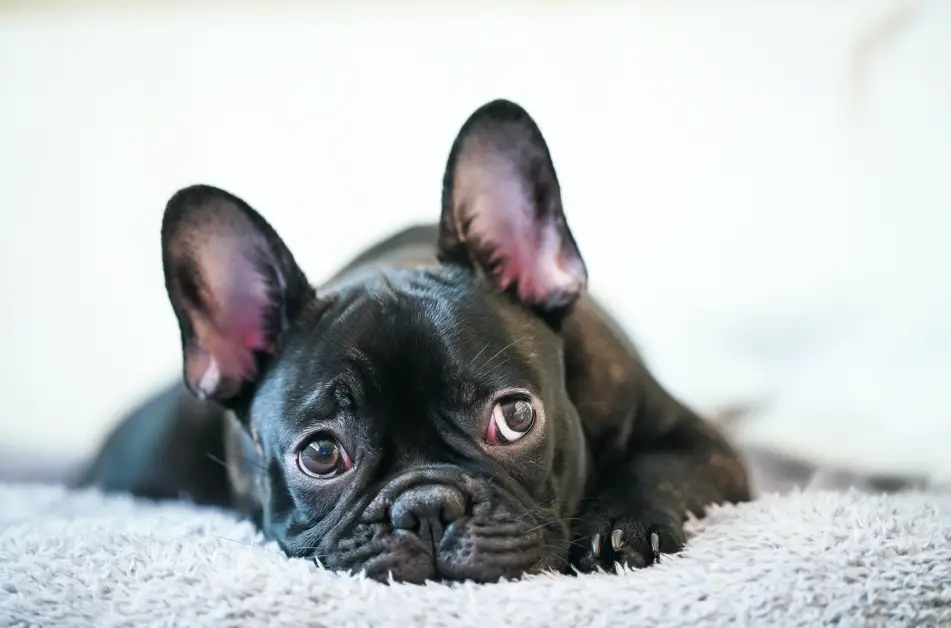
Techniques for Modifying Behavior
Behavioral modification techniques can help redirect a dog’s tendency to chew their paws. These techniques emphasize positive reinforcement and redirecting unwanted behaviors.
You can use these techniques to help reduce negative behaviors or enhance existing ones.
One technique involves using positive reinforcement whenever your dog engages in behaviors that are incompatible with paw-chewing. For example, if they are chewing on their paws, you can redirect them to play with a chew toy instead. Reward them with treats or praise when they engage in the positive behavior.
Another approach involves gradually desensitizing your dog to specific triggers or events that might be causing anxiety or stress. For example, if your dog chews on their paws when they are left alone, you can gradually acclimate them to shorter periods of being left alone.
Assessing Your Dog’s Environment
Creating a stimulating, supportive, and nurturing environment is foundational to managing paw-chewing effectively. It involves optimizing your dog’s daily routine, providing social interaction, and ensuring sufficient exercise.
Creating a Stimulating Environment
Beyond providing toys and interactive games, creating a safe and engaging space for your dog is crucial. This involves considering the design of the spaces where they spend the most time and tailoring them to both physical and mental stimulation.
Dogs, much like humans, require safe havens where they can relax and feel secure. Designate a comfortable nook in your house or backyard where they can retreat to when they need a break from activity or interaction. It could be a bed in a quiet corner or a dedicated area with blankets and specific chews.
Ensure that the environment is free from any harmful substances or materials that might cause irritation or toxicity. Consider a wide range of interactive toys, chews, and puzzles, making sure that they are safe and appropriate for the dog’s size and play style.
The environment also includes the smells, sounds, and sights that your dog is exposed to regularly. Some dogs are more sensitive to changes in these aspects of their surroundings and are more susceptible to anxiety and stress.
Socialization Opportunities for Dogs
Social interaction is integral to a dog’s mental health. Socialization can prevent loneliness and provide a foundation for positive interactions.
The benefits of socialization are immense when considering our dogs’ well-being. Dogs that are more socialized, particularly those who are socialized when they are puppies, are usually more comfortable with other dogs and humans.
Provide opportunities for your dog to interact with safe and friendly companions. This can involve letting them play with other dogs at a dog park or enrolling them in a structured obedience class.
However, ensure that the experiences are positive and comfortable for your dog. If they seem overwhelmed or anxious, it’s essential to provide them with a break and allow them to retreat to a safe space. It’s also wise to observe different interactions to determine if the interaction is comfortable for your dog.
The Benefits of Regular Exercise
Physical activity is a phenomenal way for dogs to burn energy, relieve stress, and strengthen bonds with their owners. Regular exercise enhances both physical and mental well-being.
When dogs are engaged in physical activity, they are less likely to develop undesirable behaviors. Exercise is essential for regulating hormones and promoting better sleep quality, particularly in dogs.
Dogs benefit greatly from activities such as walks, hikes, or runs. It depends on your dog’s breed and individual needs. The more you engage with them during these walks or hikes, the more your bond will increase over time.
Engage your dog in fun activities to encourage physical activity. This can include playing fetch, having them chase balls or frisbees, or swimming. Engaging in these activities is beneficial for both the physical and mental health of your dogs.
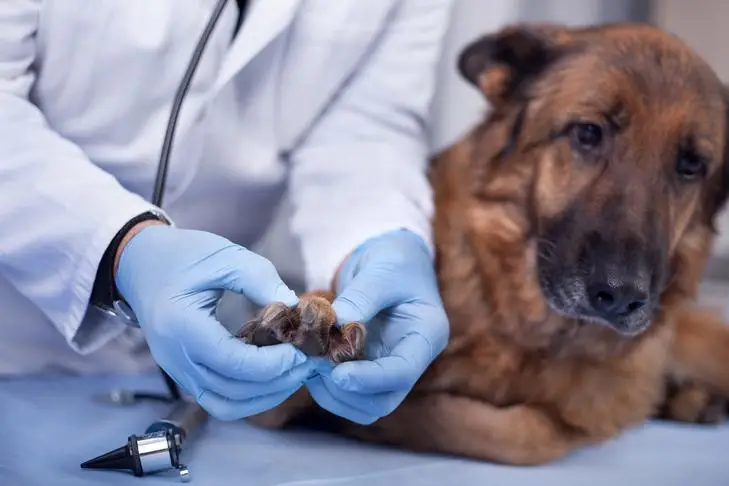
Strategies for Managing Paw-Chewing
Implementing positive reinforcement, providing engaging toys, and scheduling regular veterinary check-ups are crucial components of managing paw-chewing behaviors effectively.
Implementing Positive Reinforcement
Positive reinforcement can be a vital tool for redirecting behavior. It focuses on rewarding desirable actions, encouraging your dog to repeat them in the future.
Using reinforcement is a powerful tool for teaching dogs how to modify their behaviors. It can help you effectively manage unwanted behaviors, such as chewing on their paws. For example, if your dog is chewing on their paws, calmly redirect their attention to a chew toy instead. When they engage in the more desirable behavior, reward them with praise or treats.
Make sure that you are using positive reinforcement from the beginning of your dog’s training to help encourage them to adopt preferred behaviors.
It’s important to find a treat or praise that works best for your dog. Different dogs have different preferences. Some dogs might prefer a belly rub, special words, or a particular toy.
Engaging Toys and Mental Challenges
Engage your dog’s mind and body with a variety of toys and interactive games. This can help distract them from unwanted behaviors and provide much-needed mental stimulation.
Provide a wide range of toys suitable for your dog’s specific needs. They can include chew toys, puzzle toys, or interactive games.
Ensure that the toys are safe and durable. It’s essential to replace toys with holes or damage before they can be chewed and swallowed, presenting a potential choking hazard.
When a dog is mentally stimulated, they are less likely to develop negative behaviors. Puzzle toys are particularly beneficial for keeping your dog engaged and providing them with a sense of purpose.
Scheduling Regular Vet Check-Ups
Regular veterinary check-ups are fundamental for maintaining your dog’s overall health. Veterinarians can assess their physical health, detect potential issues, and address underlying medical concerns.
Regular vet visits are essential for maintaining optimal health. Your vet can check for skin issues like infections or parasites, which can cause excessive paw-chewing.
It’s beneficial to establish a relationship with your vet from the very beginning and to communicate with them about any issues that you notice. It’s easier to identify potential problems when they are first emerging.
Prompt treatment of medical issues can help prevent complications and manage paw-chewing effectively.
Consulting with Professionals
In some situations, seeking professional guidance from veterinarians, dog trainers, or behaviorists is essential. Their specialized insights can provide a more comprehensive understanding of your dog’s paw-chewing and offer a tailored approach to management.
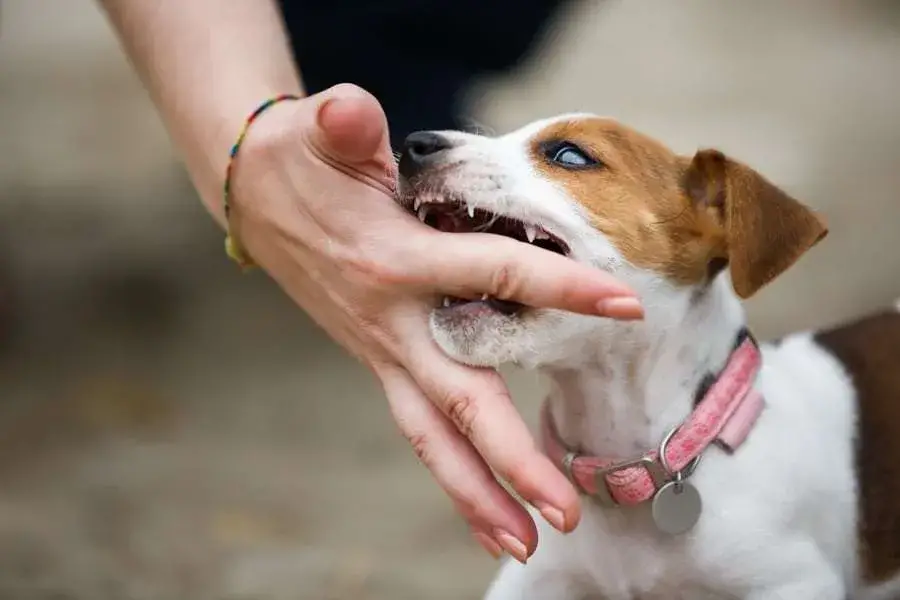
When to Seek Veterinary Advice
If you suspect your dog’s paw-chewing might be linked to a medical condition, don’t hesitate to seek veterinary attention. Prompt treatment can prevent further discomfort or complications.
If you notice signs of a medical condition, such as intense redness or inflammation, or unusual bleeding from the paws, seek immediate veterinary attention.
Any injury or infection on the paws should be addressed professionally as soon as possible.
The vet can perform a detailed examination, potential blood tests, and other examinations to diagnose the cause of the paw-chewing. They might recommend specific treatment or medication to address the issue and improve your dog’s comfort.
Potential Tests and Treatments for Allergies
When allergies are suspected, veterinarians might recommend various tests to determine the specific triggers. Treatment options vary depending on the severity of the allergy.
Allergy testing involves identifying specific allergens to which your dog is sensitive. Your veterinarian might conduct skin tests or blood tests to help identify these allergens.
Treatment options for allergies can include medications like antihistamines or corticosteroids. These help reduce inflammation and alleviate symptoms. Veterinarians might also recommend specific diets for dogs with food allergies.
Involving a Dog Trainer or Behaviorist
If paw-chewing appears to be related to behavioral issues, such as anxiety or stress, consider consulting a professional dog trainer or behaviorist.
Behavioral issues like anxiety can be difficult to address on your own. A professional dog trainer can educate you on the best practices for management and can help you structure your training approach accordingly.
Dog trainers have a wide range of expertise that helps address a variety of behavior issues. They can help you understand the reasons behind your dog’s behavior and develop a plan to help curb unwanted habits.
Behaviorists focus on the psychological aspects of a dog’s behavior. They can help identify potential triggers for anxiety or stress and provide techniques and strategies to reduce these behaviors.
Strengthening the Human-Dog Bond
Building a strong and nurturing relationship with your dog is fundamental to their well-being. It involves fostering trust through active engagement, effective communication, and creating a sense of security through shared routines.
Building Trust Through Engagement
Engaging with your dog actively fosters trust and strengthens your bond. It involves demonstrating love, providing attention, and creating opportunities for shared experiences.
Dogs feel safe when their owners are actively engaged with them. When you spend time with them, listen to them, and pay attention to their needs, they feel reassured that you care about them.
Engage in interactive games, go for regular walks, offer cuddles and affection, and create opportunities for them to be able to express themselves comfortably and with as little anxiety as possible.
Dogs thrive on positive interactions with their owners. Make sure you engage with them in a positive manner.
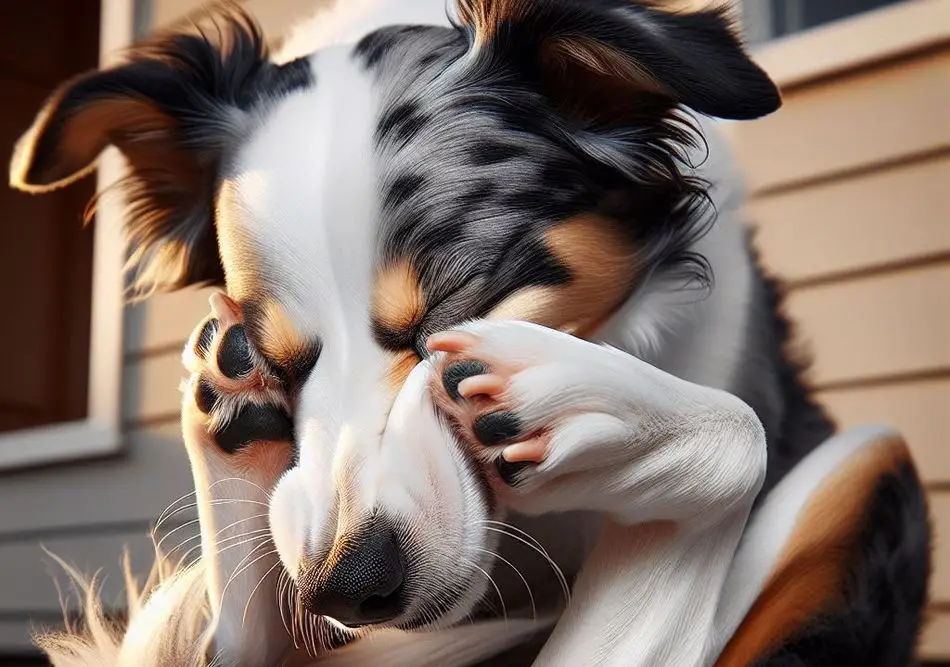
The Importance of Communication with Your Dog
Effective communication is essential for a strong human-dog bond. It involves interpreting their signals, responding appropriately to their needs, and creating a clear and consistent language of interaction.
Dogs use body language to communicate their needs, feelings, and emotions. Learning to decipher these signals can lead to a stronger bond with your dog.
Practice clear and consistent communication to convey to your dog what you expect from them. For example, using specific words for commands and consistently rewarding them for the execution of commands can significantly enhance understanding and behavior.
Consistent and clear communication will develop a stronger bond with your dog. It can also help you understand what they might need. They are more likely to open up to you and communicate more freely if they feel secure and safe.
Daily Routines That Foster Connection
Establishing a routine that involves consistent interactions with your dog strengthens your bond. It creates a sense of structure and predictability, encouraging a feeling of security and comfort.
Dogs thrive on routines and predicability. When you follow a routine, they know what to expect from you, resulting in a sense of security and comfort.
Consistent routines promote security. Dogs who feel secure tend to be more relaxed and are less likely to engage in negative behaviors that can be linked to anxiety.
Incorporate activities that strengthen your bond into your daily routine. This can include playtime, training sessions, or simple cuddle time. These routines will be helpful for both parties involved.
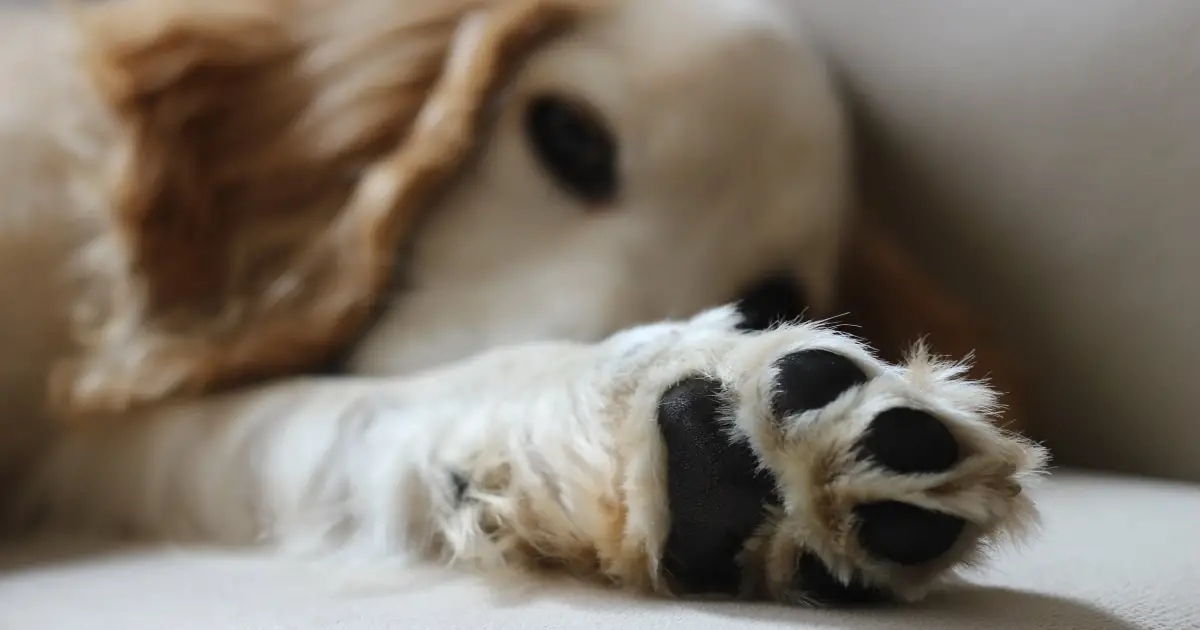
Conclusion
Understanding the reasons behind your dog’s paw-chewing behavior is essential for her well-being. By considering various factors such as allergies, boredom, and emotional needs, you can create a more supportive environment that addresses her specific challenges. This proactive approach not only helps alleviate her discomfort but also enhances the bond between you and your canine companion. By observing your dog’s behavior carefully, seeking professional help when needed, and implementing proactive strategies, you can help them navigate through potential stressors and support their overall health and happiness.
Remember that each dog is unique, and what works for one dog might not work for another. The key is to foster a deep understanding of your dog’s individual needs and adapt your approach accordingly. Just as you seek comfort and support during times of adversity, your furry companion also deserves to experience a life free from discomfort and filled with love.

